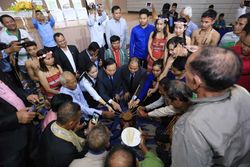
Members of several indigenous groups take part in a ceremony at a national consultative seminar on Thursday. HEAN RANGSEY
Indigenous groups call on gov’t for speedy registration of collective land
Soth Koemsoeun
Representatives of 24 indigenous groups from 15 provinces on Thursday urged the government to solve their outstanding land dispute and expedite the process of registering their collective farmland to prevent private companies grabbing it.
The appeal was made during a national consultative seminar under the theme “Strategic Planning for the Preservation and Development of Indigenous Communities. The event was attended by government and civil society organisation representatives and around 300 indigenous people.
Tep Toem, one of the representatives, said indigenous communities are most concerned about land grab and forest clearance by companies that have received economic land concessions. She said such encroachment has cost them livelihood, shelters and traditions, among others.
Toem said while her community relied on forest and mountain land, and natural ponds and canals for a living, some private companies had turned them into sugarcane plantations.
Although the Ministry of Land Management, Urban Planning and Construction had measured and registered her community’s collective farmland, she said the measurement was done with errors and did not correspond to their wishes.
She urged the government to help return the land and register it as collective land for indigenous communities.
“We call on relevant ministries to help solve our land dispute and register our collective land as soon as possible so that we have enough rights to use it for farming.
“We are so worried that one day a company’s machinery would be sent to demolish our houses while we are sleeping,” she said.
Kreung Tola, a Bunong community representative from Mondulkiri province who also attended the seminar, said indigenous people are generally left homeless while locked in land dispute.
He said most of them were forced to migrate for work abroad, especially Thailand, after losing their land and forest.
“We have sought solutions to our land dispute so many times, but the top leaders just sent officials to inspect our land for a while and then backed off. Their work seems to be so late,” he said.
Pheap Sophea, land and forest programme manager at NGO Forum on Cambodia, said some indigenous communities in Preah Vihear, Ratanakkiri, Mondulkiri, Stung Treng, and Koh Kong provinces are still mired in land dispute with companies that had received economic land concessions from the government.
He said late land registration resulted from a lack of cooperation among relevant parties and budget to do the work, while indigenous people lack clear legal land documentation to show to the authorities.
Sophea urged relevant authorities to speedily register their land anyway.
“Indigenous communities do not have clear legal land documentation at all. They urge the government to register their collective land because they want to protect it,” he said.
Ministry of Land Management spokesman Seng Lout declined to comment on Thursday.
Nuon Danhel, Ministry of Rural Development secretary of state who presided over the seminar, said the ministry formed a technical team in May to implement action plans for the preservation and development of indigenous communities.
He said the ministry was working with other relevant institutions to set up fund needed to execute the action plans.
“We are really a bit late in registering their land because some in the indigenous communities do not fully cooperate with our officials,” he said.
According to a report from the Ministry of Rural Development, there are 24 groups of ethnic minorities throughout the Kingdom, accounting for 1.34 per cent of the whole Cambodian population.













